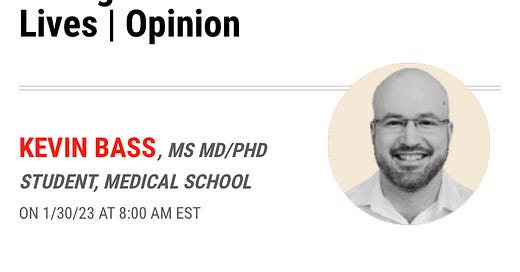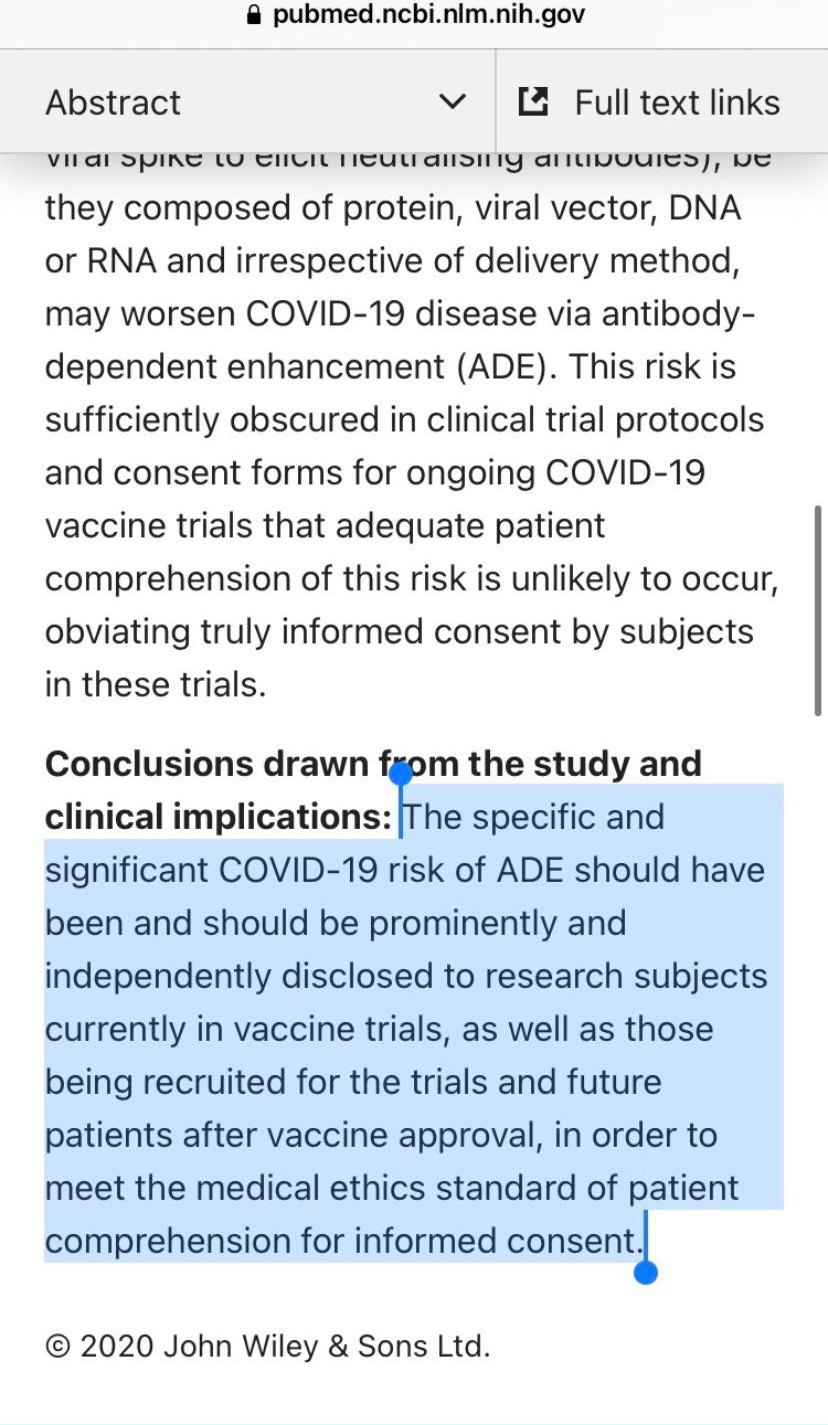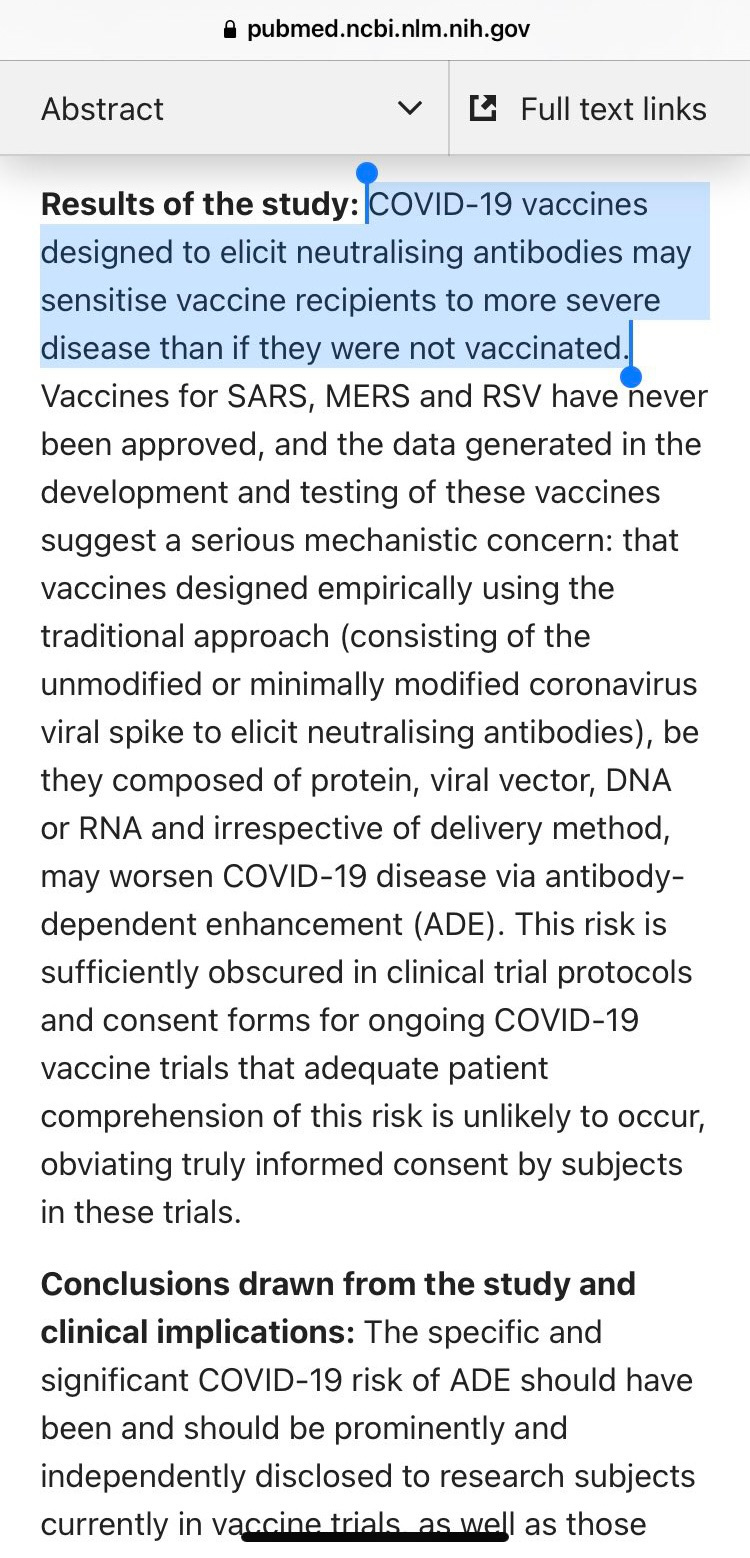Kevin Bass is the new Emily Oster — on his unintentionally hilarious call for admissions of Covid guilt from policy makers and the scientific community
Another communication analysis!
Kevin Bass opens his Newsweek editorial with this astonishing confession:
“As a medical student and researcher, I staunchly supported the efforts of the public health authorities when it came to COVID-19. I believed that the authorities responded to the largest public health crisis of our lives with compassion, diligence, and scientific expertise. I was with them when they called for lockdowns, vaccines, and boosters.
I was wrong. We in the scientific community were wrong. And it cost lives.”
This was instantly mind-boggling to me: are we really truly to believe the author is sincerely filled with regret? With remorse? Hold on, Kevin, let me get this straight: you don’t believe the authorities responded with compassion, diligence, and scientific expertise? Seriously, are you telling us the calls for lockdowns, vaccines, and boosters are calls that weren’t warranted? Spoiler alert: he answers my (non-rhetorical) questions throughout the article, over and over again. He’s not saying that at all.
If our public health officials had led with less hubris, the course of the pandemic in the United States might have had a very different outcome, with far fewer lost lives.
Here, he says that it was the hubris that turned people off. Not the things the health officials did but how they did it. Remember “eat in separate rooms or preferably don’t celebrate the holidays with family at all”? Oh, Kevin, I see!! It was the way Dr. Birx talked and all the coordinated scarves she wore that made people demand their freedom of travel back, not literally canceling Christmas.
No where in the piece does Bass say the vaccine mandates were unethical or immoral. Not once does he say the lockdowns should not have taken place. If you’re new to my substack and new to my process, it goes like this: I analyze a given piece of writing through three elements of communication: what’s being said (literally, the meaning of the words being spoken or written), what’s really being said, and what’s being left unsaid. What’s being left unsaid is weighted. It’s oftentimes the most important part. “I was wrong” is a sham apology in this case because he never specifies what he was wrong about. And guess what else he never says? “I’m sorry” or “I apologize for the consequences of my actions and my silence.” This guy. (And his grad student female ghostwriter, who we’ll get to in a moment.) He dips a toe in the waters of taking responsibility, saying, “…when Dr. Antony Fauci opposed Trump and became the hero of the public health community, we gave him our support to do and say what he wanted, even when he was wrong.” Ok, Kevin — but when was he wrong? Which actions did he take that were incorrect? Kevin doesn’t say.
What he does say is horrifying enough though, God help me and us:
My motivation for writing this is simple: It's clear to me that for public trust to be restored in science, scientists should publicly discuss what went right and what went wrong during the pandemic, and where we could have done better.
Guess how many times the words trust or distrust appear in the piece?
“Trump was not remotely perfect, nor were the academic critics of consensus policy. But the scorn that we laid on them was a disaster for public trust in the pandemic response.”
(And 3.) “Instead, we have witnessed a massive and ongoing loss of life in America due to distrust of vaccines and the healthcare system … a massive loss of trust in healthcare, science, scientific authorities, and political leaders more broadly.
“… for public trust to be restored in science, scientists should publicly discuss what went right and what went wrong during the pandemic, and where we could have done better.”
“Intellectual elitism, credentialism, and classism must end. Restoring trust in public health—and our democracy—depends on it.”
Trust is such a sticky word. Isn’t it gross in a way? It drips guile. It oozes manipulation. As soon as someone says “trust me,” I know it would probably be wise not to. Now, some of you know that assessing and accepting the nature of real reality is very important to me (which is why I’m working toward a degree in philosophy that will allow me to get my certificate in Logic Based Therapy). So please let me elaborate: I posit to you that we can’t trust other people — and not because there aren’t awesome, wonderful, reliable, true-to-their word individuals in the world — but because trust is not a concept based in reality. Trust implies an absence of risk.
So let’s also define risk: the possibility or probability of danger or loss. This is why lenders will call the history of our borrowing and repayment patterns a “credit report” but have their in-house Risk Management department evaluate it when we come knocking for a mortgage or line of credit or car loan, etc. Our consumer credit score is, in all its statistical error (because it is calculated by human beings who are not omniscient), a pretty good predictor of our future behavior, but no lender “trusts” any of their borrowers. Instead, they assess the risk that they may not be repaid and if the risk (the statistical probability) is low enough, they choose to lend the money anyway. The use of the word “credit” makes it sound like the lender believes in us or has faith in us. It’s silly, but I get a kick out of this type of language manipulation. (Reminds me of “credit card companies” — ok, you mean banks? Lol.) Banks view our borrowing and repayment history in the light of risk, not trust, and sometimes choose to take the financial risk (which is the definition of a gamble) because of our “good” past behavior and despite the slew of unknowns that may affect our behavior in the future. After all, it might turn into “bad” behavior. There’s always a chance, however small: there’s inherent risk.
I think people like us — naturally curious and questioning people who read a lot — are always unconsciously (or consciously!) assessing risk. We know power corrupts and absolute power corrupts absolutely and that means — it literally means — that people in power are the most potentially dangerous of all. (As a brief funny aside, my mom used to say that all the time when I was a kid. Then one day I came home from school in the tenth grade and confronted her with, “Mom, you know how you always say power corrupts and absolute power corrupts absolutely? Well a real guy said that! We learned it in history class today!” And she said, “So?” And I said, “well, you always said it was ‘an old adage’! But it was Lord Acton!”)
Last February, almost a year ago now, the Department of Homeland Security issued a call for “trusting the authorities” and literally labelled those who don’t as “threat actors seeking to exacerbate societal friction to sow discord and undermine public trust in government institutions.”
Which leads me to my bottom line analysis: the powers that be are Monday morning quarterbacking. Why didn’t people just do what we said and obediently comply? Because they don’t trust us. If they trusted the media, the government, and scientists, they would do what they were told, like good little boys and girls.
Wow. I mean, wow. No wonder it took them so long to find bin laden.
Bass is the puppet they’ve sent out to deliver this narrative. I suspect that they are seeking the kind of unity our country felt right after 9/11. After all, no one (besides the ACLU and one Senator and one Representative) blinked at the AUMF, the PATRIOT Act and a brand new extra-judicial Club Fed resort that popped up over night in sunny Guantanamo Bay. But for some reason, some mysteeeeeerious reason, 20 years later during the pandemic, we “resisted” as Bass puts it.
“We made science a team sport, and in so doing, we made it no longer science. It became us versus them, and ‘they’ responded the only way anyone might expect them to: by resisting.” He carefully avoids words like protesting and refusing and objecting, opting for the words “opposing” and opponents and dissidents instead: “[censorship on twitter resulted in] … erasing the valid political concerns of the government's opponents.” Do they truly see us as their opponent, the person they have to beat in order to win? (The speech pattern analysis says yes.) He admits that they despised us, choosing the word scorn (scorn!! When was the last time you used or read that word!?).
“… the scorn that we laid on [critics] was a disaster for public trust in the pandemic response. Our approach alienated large segments of the population from what should have been a national, collaborative project.”
Oh fun! A project! A national collaborative project — like everybody contributing a square to a big giant American quilt! If people in power had just been less MEAN, the public would have trusted them more, and everyone could have cuddled under the blanky together in compulsory, er I mean, collaborative, harmony!
No, psycho. The results of the first trials showed that the vaccine causes antibody dependence enhancement. Back in 2020, scientists “discovered” this, and then the study results were announced publicly in March of 2021. Link to the study here or read the highlighted screenshots below.
I was never going to CONSENT to anyone injecting me with that poison. Their 3 year clown show only revealed how actually low IQ and/or sadistic you have to be to work for the fiasco we call federal government. As I mentioned in my satirical piece the other day, only keeping me from learning to READ could have made a difference.
But — let’s acknowledge this — it’s actually very disturbing because the only reason one Monday morning quarterbacks is so that one can win the next game. They want to identify how better to induce compliance for the next pandemic.
But you want to know the most beautiful thing that has come out of this entire colossal shit show?? This tweet from Aaron Siri.


When the next vaccine comes out, people are going to ask questions. A lot of people. A lot of questions. (In case the tweet is ever deleted, it said, “In Iowa, often a barometer of national views, "Just 34% of Iowa adults now say all children should be required to receive standard shots unless they have a doctor-signed statement showing they have a medical reason not to be vaccinated." A clear minority.”)
Now, for the hilarious parts of this bizarro op-ed. They think we’re stupid: “Lacking the scientific lexicon to express their disagreement, many dissidents turned to conspiracy theories and a cottage industry of scientific contortionists to make their case against the expert class.” Ah yes, conspiracy theories! LMAO. Like having to show your papers in order to be granted permission to walk into a restaurant? Oh no wait — THAT ACTUALLY HAPPENED.
The best part: Bass suggests that the government and scientific community weren’t woke enough to work the room! Seriously!!
“… the poor, the working class, small business owners, Blacks and Latinos, and children …would be most negatively impacted by our policies …. These populations were overlooked because they were made invisible to us by their systematic exclusion from the dominant, corporatized media machine that presumed omniscience.” Invisible? They were deemed essential workers in many cases because someone had to keep the grocery stores open. They were the only humans I got to see on a regular basis for four months while working from home under the initial lockdown. (I like “media machine that presumed omniscience” though.)
Like the Emily Oster piece, there are multiple indicators of a ghostwriter — but this one isn’t a deep state mean girl. This one loves alliteration.
Ladies and gentlemen of the substack jury: please read the following paragraph, ostensibly written by one Kevin Bass. I have highlighted the alliterative phrases for your convenience, lol.
“And this despite the fact that pandemic policy was created by a razor-thin sliver of American society who anointed themselves to preside over the working class—members of academia, government, medicine, journalism, tech, and public health, who are highly educated and privileged. From the comfort of their privilege, this elite prizes paternalism, as opposed to average Americans who laud self-reliance and whose daily lives routinely demand that they reckon with risk. That many of our leaders neglected to consider the lived experience of those across the class divide is unconscionable.” (Again with the “we were blinded and unable to induce compliance, er, I mean trust, due to our privilege and lack of wokeness” lol.)
Ok now please read this additional example of an attempt to attribute the failure of Covid policies to a lack of wokeness, alliteration highlighted:
“We excluded important parts of the population from policy development and castigated critics, which meant that we deployed a monolithic response across an exceptionally diverse nation, forged a society more fractured than ever, and exacerbated longstanding health and economic disparities.”
Now I present to you one Kevin Bass.
(Embedded youtube video of an interview of Kevin Bass above.)
Is this a man who says, “castigated critics”? Or “forged a society more fractured than ever”?
No. LMAO.
This ghostwriter is a whole new level of Jane Austen-loving, INFP-typing, morning-journaling, poetry-writing, English major, journalism (or French) minor, deep state intern. I even love the musicality of the line “sliver of American society who anointed themselves to preside over the working class.” But Kevin Bass didn’t write it.
One final observation: who on Earth, out of all 7 billion of us, is satisfied with “I was wrong” unless it is accompanied by a willingness to make amends? It strikes me as so strange, this idea that if enough basically unknown but de facto public figures say, “we made a mistake,” then the American people will just move on. So let’s try to answer that question: for whom would “I was wrong” be enough? Well, I’ve seen couples argue and just want the other person to admit they were wrong. I’ve also seen parents make their kids admit they were wrong but never without also forcing the child to “say sorry.” Ironically, it heartens me to see that this piece is promoting a message that would only apply to the unique power dynamic of an old married couple because that’s not the power dynamic between the American people and the American government. The degree of lack of awareness of reality itself that was required to think that this message would work to shift the narrative could be attributed to a few things — youth, inexperience, low IQ (what else did I miss?). But this is actually GOOD. Because it means we’re dealing with weakness. All we have to do is be stronger (smarter, more experienced, braver) and we will win. We will continue to win.
***********************************************
Thank you, dear subscribers, for reading and subscribing and commenting — it means so much!
Please follow me on Twitter: https://twitter.com/Sarah__Reynolds
Please support me on Patreon: https://www.patreon.com/tribalroles
Please subscribe to my youtube channel: https://www.youtube.com/user/snowangel448
Enjoy my Emily Oster speech pattern analysis here
Read my piece on Trading Trust for Calculated Risk here
Check out my post “You aren’t pro-choice or pro-privacy rights if you don’t oppose forced personal medical history disclosure (which means we have to discuss The Truth About HIPPA)” here
Remember, if you’re going through hell, keep going!
A tiny bit of housekeeping: sending emails from substack straight to spam or junkmail is the new censorship/shadowban by yahoo/gmail. So if you add sarahreynolds@substack.com to your contacts, you will always get the emails when a new post is up in your regular inbox.
If you’re still reading … I have been known to generously and enthusiastically alliterate myself so, yes. Also, there are two types of historical romance reading girls out there who are introverts who write in this person’s style. I know this because I am the other one: the Charlotte and Emily Bronte-loving, INFJ-typing, night-journaling, save-the-world-yearning-to writer. I think I recognize Catholic school education in the writer’s style as well: the flow, organization and clarity of the piece is excellent, and I like to give credit where credit is due. Good job retaining one voice throughout. Men don’t typically use alliteration (dead poets notwithstanding) so that was the giveaway that the writer was female.






Brilliant analysis: on trust. I loved:
"The use of the word “credit” makes it sound like the lender believes in us or has faith in us. It’s silly, but I get a kick out of this type of language manipulation. (Reminds me of “credit card companies” — ok, you mean banks? Lol.)"
You have a gift for sizing/ expressing the essence of the matter:
"I think people like us — naturally curious and questioning people who read a lot — are always unconsciously (or consciously!) assessing risk. We know power corrupts and absolute power corrupts absolutely and that means — it literally means — that people in power are the most potentially dangerous of all."
All of these articles sound like they came from college educated students that learned how to write flashy without saying much.
https://www.orwellfoundation.com/the-orwell-foundation/orwell/essays-and-other-works/politics-and-the-english-language/